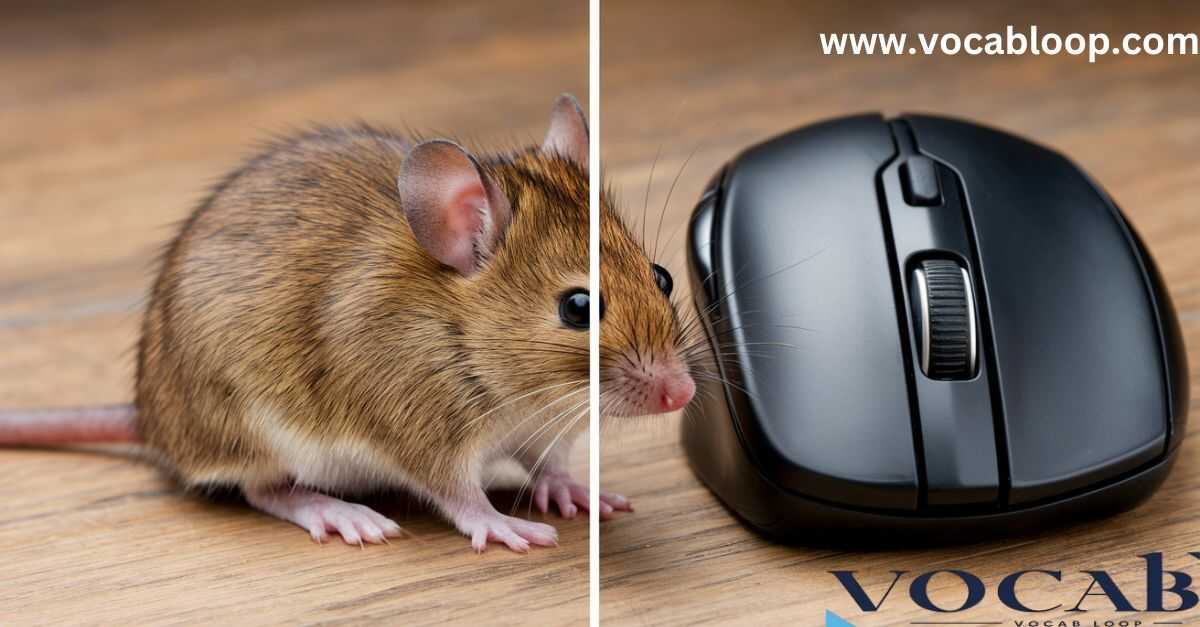In the evolving landscape of English, “mouses vs mice” sparks debate. Whether a grammar enthusiast or a tech user, you may wonder about the correct plural form. This distinction clarifies communication and reflects language’s adaptability in biology and technology.
Is it “mouses” vs “mice”? This comprehensive guide will dive deep into this linguistic conundrum, exploring the etymology, usage, and cultural significance of these terms.
What does the Word “Mouse” Mean?
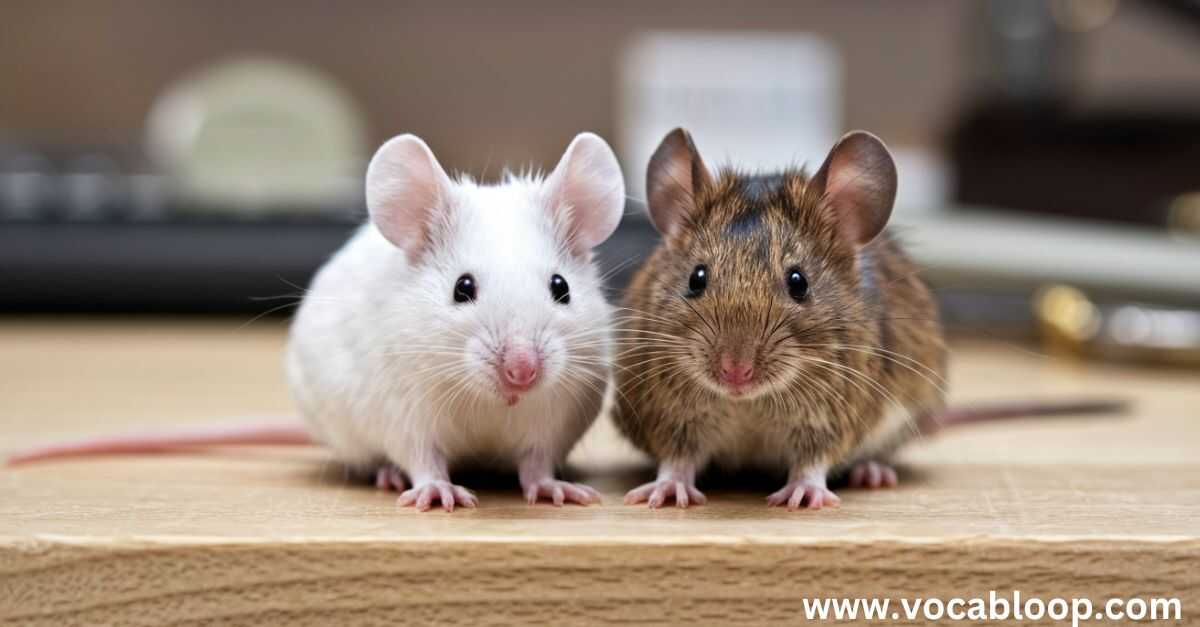
The word “mouse” carries two primary meanings in modern English:
- Animal definition: A small rodent, typically with a pointed snout, rounded ears, and a long, thin tail.
- Technology definition: A handheld device used to control a cursor on a computer screen.
These dual meanings add an intriguing layer of complexity to our pluralization debate. The word’s journey from describing tiny mammals to becoming a crucial computer peripheral is a testament to the adaptability of language.
Etymology: Tracing the Word’s Ancient Roots
To truly understand the “mouse” conundrum, we need to delve into its linguistic history:
- Proto-Indo-European: The ultimate ancestor of “mouse” is believed to be the root *mūs-, meaning “to steal.”
- Proto-Germanic: This evolved into *mūs, referring specifically to the small rodent.
- Old English: The word appeared as mūs, already with the plural form mȳs.
This early plural form gives us a clue about why “mice” persists as the standard plural today. It’s a remnant of an ancient system of noun declension that has largely disappeared from modern English.
What’s the Difference between “Rat” and “Mouse”?
Before we dive deeper into plurals, let’s clear up another common source of confusion: the difference between mice and rats. While both are rodents, they have distinct characteristics:
| Feature | Mouse | Rat |
| Size | Smaller (2-4 inches body length) | Larger (6-9 inches body length) |
| Tail | Thin, long relative to body | Thick, shorter relative to body |
| Ears | Large relative to head | Smaller relative to head |
| Snout | Pointed | Blunter |
| Behavior | Generally timid | Often bolder |
What is the difference in American and British English?
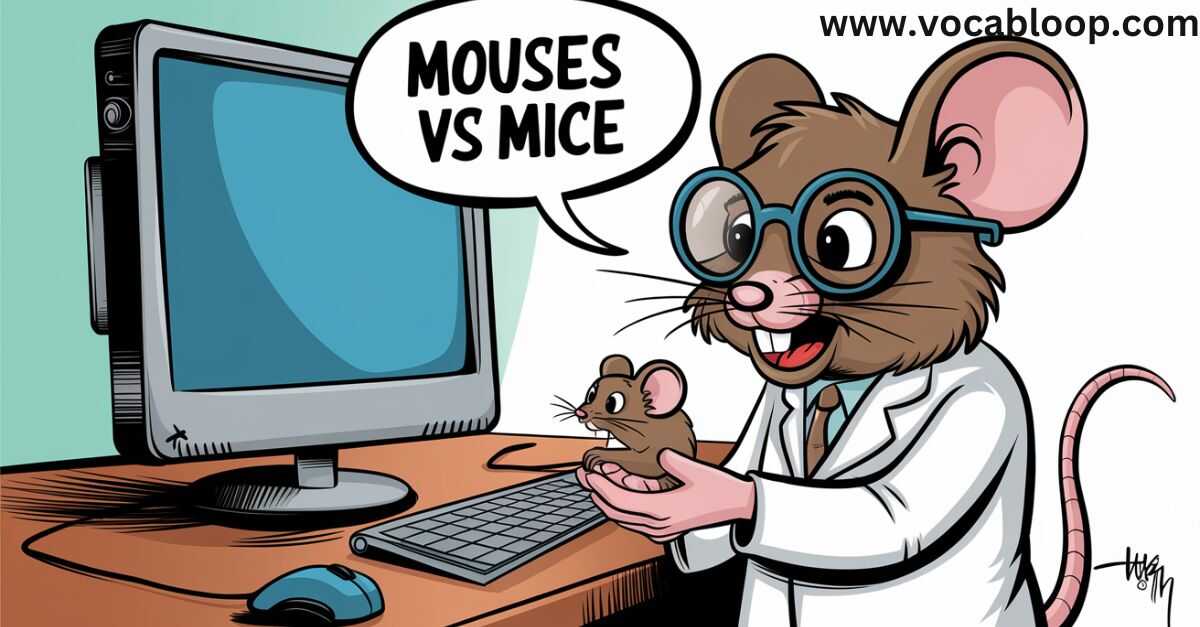
When it comes to the pluralization of “mouse,” there’s surprisingly little difference between American and British English. Both varieties overwhelmingly prefer “mice” as the standard plural for both the animal and the computer device.
However, there are some subtle distinctions:
- British English tends to be more conservative in this regard, almost universally using “mice” in all contexts.
- American English shows slightly more tolerance for “mouses” in technical contexts, particularly when discussing computer peripherals.
It’s worth noting that in both varieties, “mice” remains the dominant form across all contexts.
Plural of “Mouse”
Now we arrive at the heart of our discussion: what’s the proper plural form of mouse?
The Traditional Plural: Mice
“Mice” is widely recognized as the standard plural form for both the animal and, increasingly, the computer device. This irregular plural formation is a linguistic fossil, preserved from Old English:
- Old English: mūs (singular) → mȳs (plural)
- Middle English: mous → mis/mys
- Modern English: mouse → mice
This type of plural, formed by changing the vowel sound of the word, is called an “umlaut plural.” It’s rare in modern English, with only a handful of words following this pattern (e.g., goose → geese, tooth → teeth).
The Upstart Contender: Mouses
While “mice” dominates in most contexts, “mouses” has gained some traction, particularly in the world of computing. This regular plural formation follows the standard English pattern of adding -s or -es to form plurals.
When and why did “mouses” emerge?
The rise of “mouses” coincides with the advent of the computer mouse in the 1960s. As this new technology became ubiquitous, some users and even tech professionals began using “mouses” to distinguish multiple pointing devices from the furry creatures.
Contexts where “mouses” is used:
- Some technical documentation and manuals
- Casual speech, especially among non-native English speakers
- Occasionally in retail settings (e.g., “Buy two mouses, get one free!”)
Pronunciation: Mouses vs Mice
The pronunciation of these plurals can trip up even native English speakers:
- Mice: /maɪs/ (rhymes with “nice”)
- Mouses: /ˈmaʊzɪz/ (sounds like “how-ziz”)
Regional variations can further complicate matters. In some dialects, particularly in parts of the southern United States, you might hear “mice” pronounced more like “mahce” (/maːs/).
Which One Should Be Used “Mouses” or “Mice”?
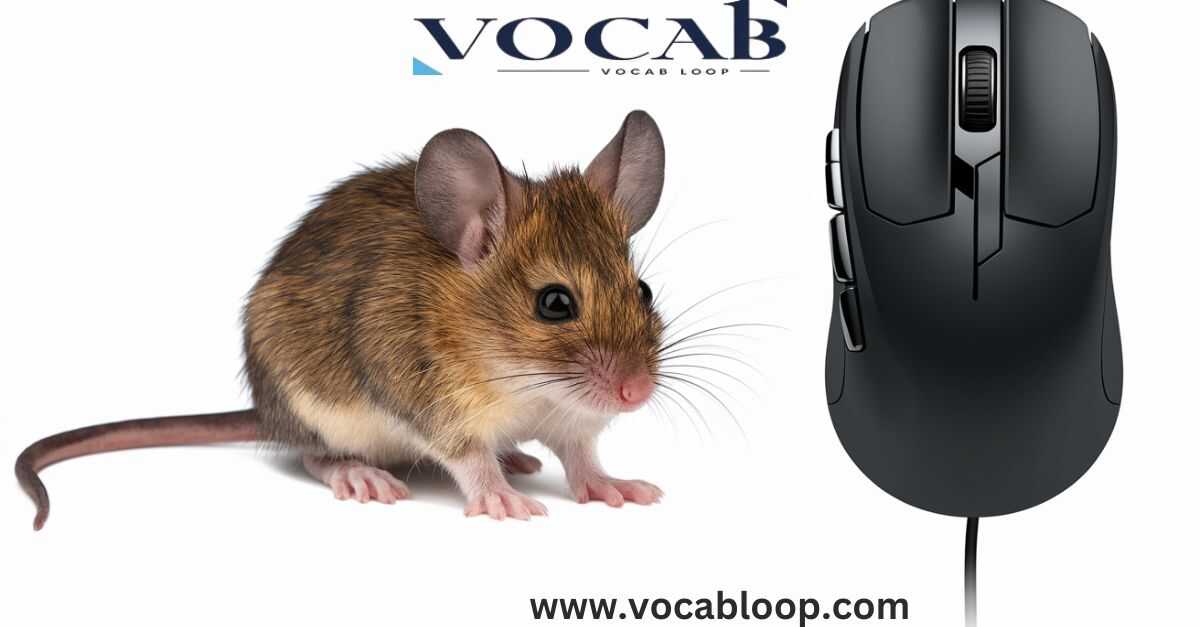
The battle between “mice” and “mouses” reflects a broader debate in linguistics: prescriptive vs. descriptive grammar.
- Prescriptive grammar focuses on rules and “correct” usage. From this perspective, “mice” is the only acceptable plural.
- Descriptive grammar observes how language is actually used. This approach acknowledges “mouses” as an emerging form, especially in certain contexts.
Most style guides and grammar authorities still recommend “mice” as the standard plural for both animals and computer devices. However, they often note the existence of “mouses” in technical contexts.
“While ‘mice’ remains the standard plural for both the animal and the computer device, ‘mouses’ is occasionally seen in technical writing. For clarity and consistency, we recommend using ‘mice’ in all contexts.” – The Chicago Manual of Style, 17th Edition
Guidelines for usage:
- Default to “mice”: In most contexts, including formal writing, academic work, and general communication, “mice” is the safest choice.
- Consider your audience: In highly technical discussions about computer hardware, “mouses” might be acceptable if it’s the preferred term in that specific community.
- Be consistent: Whatever form you choose, stick with it throughout your document or conversation.
- When in doubt, rephrase: If you’re unsure, you can always reword your sentence to avoid the plural altogether. For example, “multiple mouse devices” instead of “mice” or “mouses.”
Origins of the Word “Mouse”
We’ve touched on the etymology earlier, but let’s delve deeper into the fascinating origins of this word:
- Indo-European roots: The word “mouse” can be traced back to the Proto-Indo-European root *mūs-, which is believed to mean “to steal.” This root gave rise to similar words in many languages, including Latin (mūs), Greek (mŷs), and Sanskrit (mūṣ).
- Germanic evolution: In Proto-Germanic, the word evolved into *mūs, specifically referring to the small rodent. This form spread across various Germanic languages, including Old English.
- Old English: The word appeared in Old English as mūs, with the plural form mȳs. This irregular plural formation was part of a broader system of noun declension in Old English, much of which has been lost in modern English.
- Middle English: During the Middle English period (roughly 1100-1500 CE), the spelling began to shift towards the modern form, appearing as “mous” with the plural “mis” or “mys.”
- Modern English: By the Early Modern English period (around 1500 CE), the spelling had stabilized to “mouse” with the plural “mice.”
- Technological adaptation: In the 1960s, the term “mouse” was applied to the computer pointing device, reportedly because early models, with their cord, resembled the small rodent.
This long journey through linguistic history helps explain why “mouse” has retained its irregular plural form despite the general trend in English towards regularization of plurals.
Using “Mouse,” “Mice” and “Mouses” in Sentences
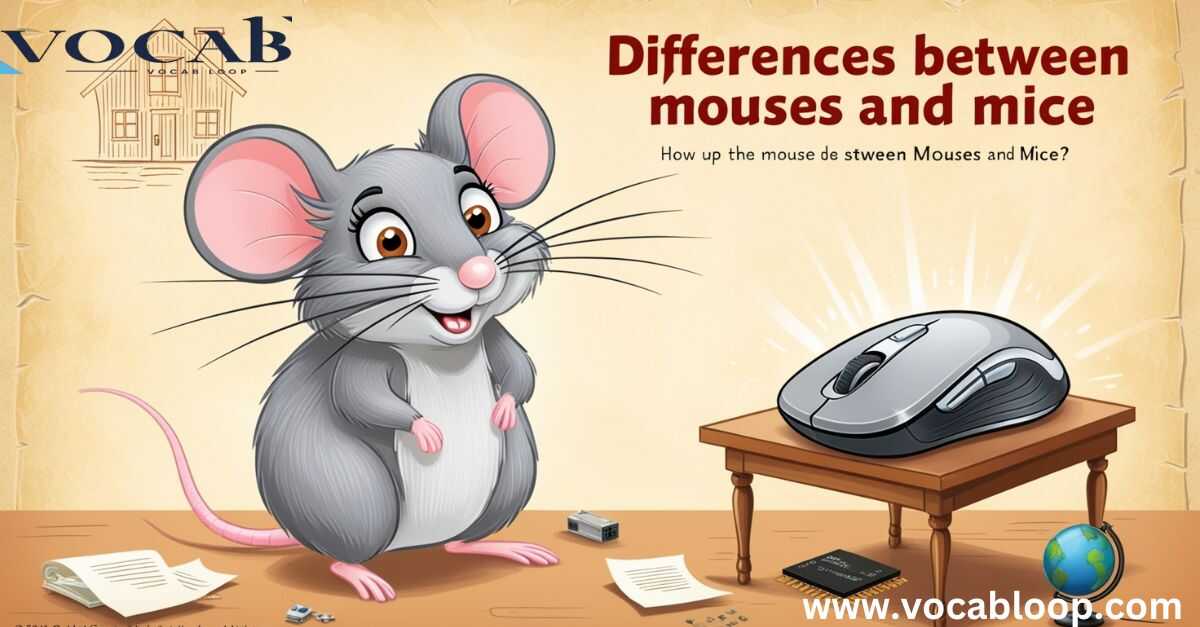
To better understand how these terms are used in context, let’s look at some example sentences for each form:
Mouse
- I spotted a mouse scurrying across the kitchen floor last night.
- The computer mouse has revolutionized how we interact with digital interfaces.
- My cat loves to chase any mouse that dares to enter our house.
- The wireless mouse offers greater flexibility for laptop users.
- Scientists often use the house mouse as a model organism in biological research.
- I need to buy a new mouse for my gaming setup.
- The mouse cursor froze on my screen, forcing me to restart the computer.
- A field mouse built its nest in our garden shed.
- The ergonomic mouse is designed to reduce wrist strain during long periods of use.
- In the children’s story, the brave little mouse outsmarted the big, mean cat.
Mice
- Laboratory mice play a crucial role in medical research.
- The pet store had a variety of mice for sale, including albino and spotted varieties.
- Our old barn is home to several families of field mice.
- Computer mice come in many shapes and sizes to suit different user preferences.
- The cartoon showed two mice outsmarting a clumsy cat.
- Modern optical mice don’t require a mousepad to function properly.
- “Three Blind Mice” is a popular nursery rhyme.
- The scientist compared the genomes of different strains of laboratory mice.
- Wireless mice have become increasingly popular due to their convenience.
- The exterminator found evidence of mice in the basement.
Mouses
- The tech store had a display of various computer mouses for customers to try.
- Some gamers prefer to use multiple mouses for different gaming scenarios.
- The IT department ordered a batch of new mouses for the office computers.
- Ergonomic mouses are designed to reduce the risk of repetitive strain injuries.
- The computer lab needed to replace several broken mouses.
- Different types of mouses include optical, laser, and trackball varieties.
- Some users find that vertical mouses provide better comfort during long work sessions.
- The electronics store was running a sale on wireless mouses.
- Mechanical mouses with balls have largely been replaced by optical and laser models.
- The tech support forum had a discussion about the best mouses for graphic design work.
Note that while these “mouses” sentences are grammatically correct, they are less common and may sound awkward to many English speakers. In most contexts, “mice” would be the preferred plural form.
Synonyms
For the animal:
- Rodent
- Small mammal
- Vermin (pejorative)
- Murine (scientific)
For the computer device:
- Pointing device
- Cursor control
- Input device
- Trackpad (for laptops)
- Touchpad
It’s important to note that these synonyms are not always interchangeable with “mouse” and may carry different connotations or levels of specificity.
Conclusion
In the discussion of “mouses vs mice,” it’s important to note that “mice” is the correct plural form of “mouse” when referring to the small rodent. However, in the context of technology, “mouses” is sometimes accepted for multiple computer devices, although “mice” remains the more commonly used term.
This distinction in “mouses vs mice” illustrates how language evolves based on context. While “mice” adheres to traditional grammar rules, the term “mouses” reflects modern usage adapted to technological advancements, showcasing the flexibility of language in response to changing environments.

Alex Hormozi is a seasoned blogger at Vocab Loop, known for his deep insights into language, vocabulary, and grammar. With years of experience in writing, Alex shares practical tips and effective strategies to help readers improve their linguistic skills and enhance their writing abilities.

